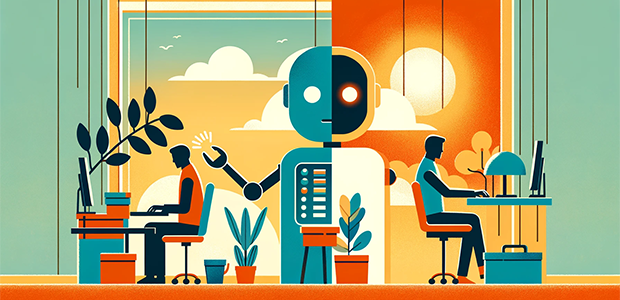
AI in the workplace contributes to lower quality of life
New technological innovations are being introduced to our lives all the time, but it turns out, these may not be as good for workers as traditional technologies.
A groundbreaking study from the Institute for the Future of Work surveyed more than 5000 people, and then analysed the impact on wellbeing of four groups of technologies that are becoming increasingly prevalent across the economy.
The study, titled ‘How is exposure to technology impacting workers’ quality of life’, and has been conducted with reference to one of the most widely accepted, multidimensional measures of health-related quality of life and wellbeing, EuroQol EQ-5D-3L.
In the past, the understanding of wellbeing concepts was poorly defined, leading to broad conclusions regarding 'stress' and 'burnout' without much clarity on their causes or effects. Additionally, the majority of previous research adopted a limited perspective on types of technology, making it difficult to unravel these associations.
New automation tech and AI are spreading fast across every part of the UK economy. It has been pointed out before that public policy has mostly been worried about how tech might cost people their jobs, but there has been less focus on how the tech we come across at work affects our quality of life. And that is exactly what this study was aiming to uncover.
What were the key findings?
- Over 60% of respondents reported interacting with digital ICTs often or always. Though, under 25% of respondents often or always interacted with newer types of technology: 20.2% with wearables, 20.8% with AI software and 23.7% with robotics. 50.8% interact with two or more of these technologies at least sometimes.18% of respondents say they interact with all four types of technology at least sometimes.
- Significant variation in employees’ quality of life correlated to increased levels of exposure to different workplace technologies.
- Quality of life positively correlated with the frequency of interaction with ICT such as laptops, tablets, smartphones and real-time messaging tools increased.
- Quality of life negatively correlated with the rise in frequency of interaction with newer workplace technologies such as wearables, robotics, AI and ML software.
- Perceived rights at work, and HR philosophies that emphasise employee wellbeing, have a positive correlation with employees’ quality of life.
The researchers discovered that workers who interacted more with technologies in three categories – AI and machine learning software, surveillance gadgets like wearable trackers, and robotics – generally reported poorer health and wellbeing.
On the other hand, using well-established technologies like laptops, tablets, and instant messaging at work generally seemed to have a positive impact on wellbeing.
Commenting on the report, Anna Thomas, Co-Founder and Co-Director of the Institute for the Future of Work, said: “This flagship report for IFOW’s Pissarides Review interrogates the relationship between the exposure of AI and other automation technologies, human capabilities and quality of life for the first time. At a critical juncture, when government, policymakers and business leaders are often struggling to understand the social and wider impacts and implications of new technologies, the survey and analysis, led by Dr Magda Soffia and published today, reveals the extent of variation and trade-offs in people’s experience and their quality of life across the country. The report has significant implications for technology, health and work policy in the run-up to the General Election, inviting a much more nuanced, joined-up, participatory and systematic approach to policymaking.”
Whilst the integration of technologies, including newer technologies like AI, robotics, and wearables, in the workplace can improve productivity and automate repetitive tasks, the impact of these technologies, shown in this report, can have a negative impact on the wellbeing of workers.
When working with such new technologies, the impacts are yet to be discovered. As Professor Sir Christopher Pissarides, Nobel Laureate and lead on the Pissarides Review into the Future of Work and Wellbeing said: “As new technologies rapidly reach further into our working lives it is vital that we understand how our interactions with them impact our quality of life. This new report for the Review that I am leading into the future of work and wellbeing adds significantly to our knowledge in this area. Importantly, it does so with reference to widely-validated quality of life and technology exposure measures, thus offering - for the first time - new depths and breadths of insight, that also suggest rich areas for further work.”

